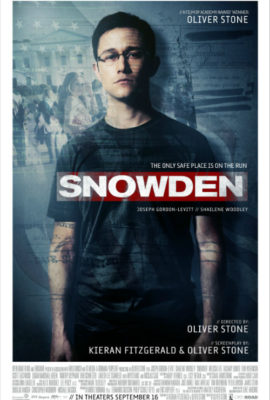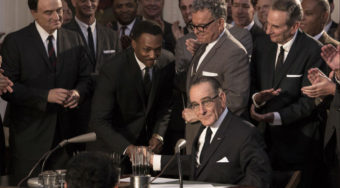Film Reviews

Snowden
Genre: Thriller, Drama
Director: Oliver Stone
Cast: Joseph Gordon-Levitt, Shailene Woodley, Melissa Leo, Zachary Quinto, Tom Wilkinson, Rhys Ifans, Nicolas Cage
MPAA-Rating: R
Release Date: September 16th, 2016
Oliver Stone’s new drama Snowden tells the true but admittedly biased story of the controversial NSA employee Edward Snowden, order who leaked thousands of secure documents about our nation’s surveillance programs to the press.
It is with a great deal of irony that Snowden — Oliver Stone’s drama about the elusive and controversial NSA officer Edward Snowden — arrived in theaters only a few short weeks after Clint Eastwood’s Sully. Chesley Sullenberger, advice the subject of Sully, viagra heroically piloted a flight onto the Hudson River when its engines seemed to fail. His story seemed noncontroversial. Snowden, on the other hand, leaked highly-confidential materials — materials that security agencies argued damaged our nation. With that in mind, one would think the film Snowden would deal with more complicated issues than Sully.
However, Sully director Clint Eastwood wasn’t interested in a simplistic story of heroism. He wanted to present a complicated and multi-faceted portrait of a man who — despite being labelled a hero — stated that he didn’t “feel like a hero.” Snowden is different. The film explores the main character seemingly from his perspective. Snowden isn’t a complicated man. He’s an undeniable hero and the feature reflects that mentality.
Director Oliver Stone presents the story in a way that Snowden, played here by Joseph Gordon-Levitt, would likely appreciate. He’s an inquisitive genius who gets hired by the National Security Agency and the CIA. When he starts working for the government, he believes in the country’s missions and goals. “I don’t really like bashing my country,” he tells his free-spirited girlfriend Lindsay Mills (Shailene Woodley).
These early scenes feel very overt in their exposition. It’s obvious that the filmmakers are setting the stage for later on when Snowden will start doubting the surveillance techniques of his country. Instead of making this aspect of his personality feel authentic though, it feels obvious and simple.
When he starts asking deeper questions about American surveillance, the questions are morally righteous but there’s never really a debate here about Snowden’s actions or questions about what was the turning point for him. When he realizes that his country is using surveillance on his own citizens, he doesn’t oppose the tactics. It takes him a while. He takes breaks from working for the government while the surveillance is ongoing so the question is what made him change his attitude. Stone never provides any great answers.
For a movie about such a complicated figure, Stone seems to remove the complications out of the story.
There are hints of a stronger story here and a few strong moments where Snowden wonders if the situation will improve on its own. It’s interesting to see Snowden with Mills celebrating Senator Barack Obama’s presidential win in 2008. As Snowden notes in a voiceover, “I thought things were gonna get better with him. I was wrong.”
Later on, Snowden’s advisor Corbin O’Brian (Rhys Ifans) tells Snowden that “Most Americans don’t want freedom. They want security.” That debate — freedom versus security and what Americans expect from their government — is sadly given short shrift here.
Instead, Stone offers a solid re-telling of the story without really delving into the larger issues at stake. Gordon-Levitt does a strong job in the leading role but oftentimes, the screenplay by Stone and Kieran Fitzgerald doesn’t really develop the character’s inner struggles in a way that would’ve made his personality change more palatable. Melissa Leo and Zachary Quinto do fine work in their supporting performances as documentarian Laura Poitras and journalist Glenn Greenwald but their characters aren’t as compelling as they could’ve been.
When the film ends with thunderous applause for the lead character, it seems obvious what perspective Stone takes. However, one only wishes that Snowden was thorough enough to present a more complete portrait of its lead character and his decisions.
Review by: John Hanlon












